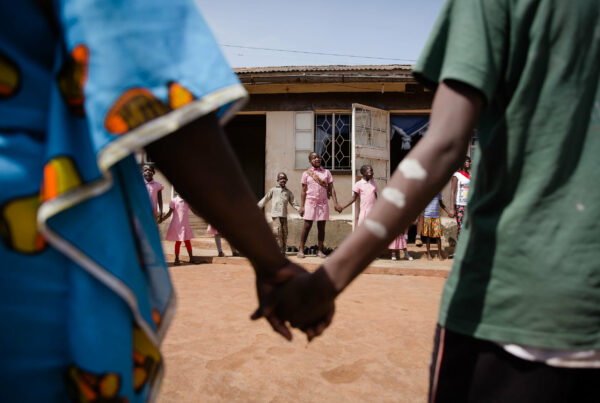“We’d been involved with Edison Elementary School, four blocks away,” says Christopher Poest, pastor of Faith Community Reformed Church in Stickney, Illinois. “And then over time, we kept asking them, ‘How else can we serve you?’”
That question—How else can we serve you?—has led to a variety of ministries between the congregation and its neighborhood elementary school. It’s the kind of question that indicates a genuine relationship, something Poest can attest to.
For a while, members of the church served as mentors to students through Kids Hope USA, a program that supports at-risk students by pairing them with adult mentors. Somewhere along the line, Poest asked Jan Bernard, Edison’s principal, how else the church could serve the school. She mentioned that pencils and glue sticks “had a tendency to walk away through the year, and that teachers paid out of pocket for them,” says Poest.
So Faith Community Reformed Church started collecting pencils and glue sticks. For the past six years, two bins in the church basement are regularly filled and brought to Edison.
In recent years, the partnership has led to Food for Hope, a program in which Faith’s members collect and package up meals and snacks for children at Edison who are food insecure.
“A few people at our church were becoming more aware of kids in the community who were food insecure,” says Poest. “We started looking at what that reality was at Edison, and saw that was a big need here, too. [Food for Hope] really developed out of another step in [our] long-term partnership.”
Poest learned a lot from Hand2Hand, a Michigan-based organization founded by Cheri Honderd, a commissioned pastor at Fair Haven Church in Hudsonville, Michigan. Through Hand2Hand, local churches provide backpacks filled with supplemental food so that students who receive subsidized lunches during the week can have enough food over the weekend, too.
With Hand2Hand’s model in mind, Faith piloted an eight-week program in the spring of 2016 to help six students. A team of people from the church collected food for easy-to-prepare meals and snacks, which they packed up and delivered to the school on Fridays.
“It was a lot of hit-or-miss in the beginning,” says Denise Slechta, a deacon at Faith who helped start Food for Hope. The team realized early on that backpacks didn’t work well for their set-up, so they switched to packing food in plastic bags. The food comes from Aldi, which has a line of organic and non-GMO foods, so the church can purchase healthy food for kids while also keeping the cost low.
After the pilot program, Faith launched Food for Hope for 54 kids at Edison.
“We discovered really quick that was beyond our capacity,” says Poest. In order to make it sustainable, they’ve consulted with the school social worker, who has identified the students with the highest need. This year, they’re supporting about 20 kids.
“It’s really rewarding, when you deliver the bags, to have a kid say thank you,” says Slechta. When Poest ran into a classroom aide at the grocery store at the beginning of the school year, she asked if Faith was planning to continue Food for Hope. A few weeks later, when Poest picked up some forms at Edison, a teacher stopped him and said, “We’re so glad you’re doing this again.”
In an effort to engage more of the congregation, Faith’s deacons decided to invite people to pack a month’s worth of bags after church on the first Sunday of the month.
“We’ve framed it as ‘table to table to table,’” says Poest. “We have the communion table on the first Sunday, then lunch together as a congregation, and then pack the bags to help the food-insecure kids eat food from their own tables.”
Poest also points out that it’s an empowering opportunity for a few people in the congregation “who are food insecure themselves. They’re often on the receiving end of these kinds of things. It’s pretty cool for them to be on the giving end.”
The impact of a long-term relationship like the one Faith has with Edison is seen beyond Food for Hope program. When the principal’s mother, Virginia, died last spring, Poest and his wife cared for both Bernard and the rest of the school staff, who had come to love Virginia through her volunteering at Edison.
“We were really there as family for Jan and a pastoral presence for teachers and staff members, and that’s a real gift and a real honor,” says Poest. “It’s an extension of our ministry here; I was really pastoring that school community at that point. … That depth of relationship doesn’t happen overnight. It happens over 14 years of involvement.”
Grace Claus serves as children's ministry coordinator for a church in the Seattle area, where she lives with her family. She holds an MDiv from Western Theological Seminary in Holland, Michigan.



